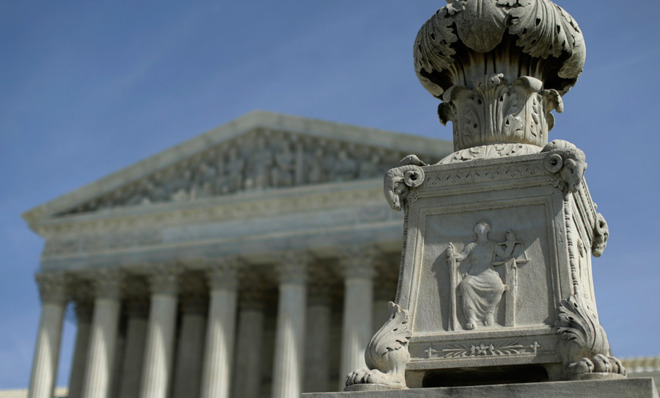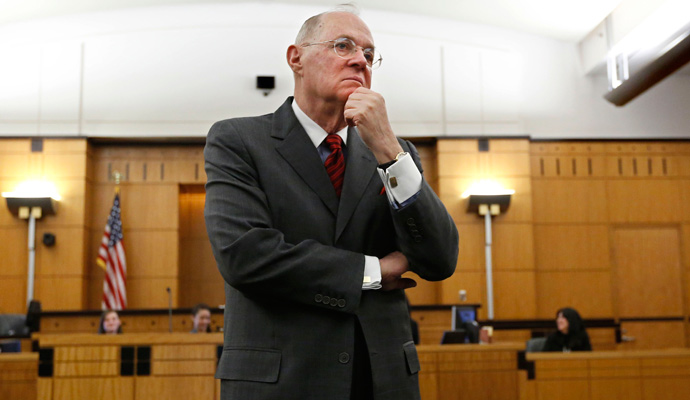What the legal fight over contraception coverage says about the Supreme Court
No one should be surprised when the court's conservatives impale this ObamaCare provision

A free daily email with the biggest news stories of the day – and the best features from TheWeek.com
You are now subscribed
Your newsletter sign-up was successful
It was inevitable that the so-called "contraception mandate" cases argued yesterday at the United States Supreme Court would generate intense interest and debate. After all, the cases center on three of the most contentious issues of our time: the scope of the Affordable Care Act, the shape of religious freedom in the workplace, and the burgeoning "personal" rights of private corporations. No wonder the most conservative, corporatist court in 75 years was so eager to take these cases.
The question of the day — the question of the past hundred days in and out of Washington — was whether the government could enforce against private companies led by religiously devout executives a requirement under the Affordable Care Act that employee health plans provide no-cost, pregnancy-related coverage to women. The executives of these companies, including Hobby Lobby, have complained that the requirement unduly and unlawfully burdens their religious beliefs by forcing them to endorse certain practices — like contraception — which they oppose.
By late June, we will have from the justices the specific answers we seek to the questions of whether corporations have the religious freedom to preclude their employees from ObamaCare-mandated contraceptive coverage. But this much we can already guess based on Tuesday's show: The divisive decision coming down the road will likely be a 5-4 ruling about female reproductive health coverage in which all three of the female justices are on one side and all but one male justice is on the other. And the decision will be more a reflection of the court's current ideology than about the stability of first amendment precedent or the text of the Religious Freedom Restoration Act.
The Week
Escape your echo chamber. Get the facts behind the news, plus analysis from multiple perspectives.

Sign up for The Week's Free Newsletters
From our morning news briefing to a weekly Good News Newsletter, get the best of The Week delivered directly to your inbox.
From our morning news briefing to a weekly Good News Newsletter, get the best of The Week delivered directly to your inbox.
A ruling against the government seems the likeliest outcome, not because precedent demands it or because the drafters of the Affordable Care Act deserve it, but because the court's personnel suggests it. When the ruling comes it will be the natural result of the court's rightward progression, which goes back decades and has picked up steam in the past eight years. Don't believe me? Close your eyes for a second and imagine Tuesday's argument, or this case more generally, with Justice Sandra Day O'Connor asking the questions and having a vote instead of Justice Samuel Alito, who replaced her in 2006, and whose disdain for the health care law, and for women's rights in general, go back a long way.

The same five justices who will likely bring the hammer down on ObamaCare's birth control mandate already told us in their Citizens United opinion in January 2010 that in the context of corporate rights they do not consider themselves tethered to traditional first amendment precedent. They already have signaled that they are willing to say that a statute that says "person" also means "corporation."
The court's conservatives mean what they are saying and they are saying what they mean. The author of the Citizens United decision was Justice Anthony Kennedy, the so-called "swing vote" on the court and its most moderate conservative. But he's sure not a moderate when it comes to seeing corporations as "persons" under the law. And he's sure not a moderate when it comes to the Affordable Care Act. Nothing he said during the argument Tuesday, even when he asked about the rights of employees who dissent from their bosses' religious doctrines, ought to give the federal government comfort that he's a fifth vote to uphold the contraception mandate no matter what burden it places on women.
The law professor and commentator Jeffrey Rosen wrote recently that a ruling against the government here could jeopardize all anti-discrimination laws. Is that enough to cause Justice Kennedy, the hero of the same-sex marriage movement, to pause before he endorses yet another expansion of first amendment corporate rights? Don't bet on it. There are probably five votes to free corporations from the religious burden of providing contraceptive coverage to employees who need it — even if those employees don't happen to share the religious beliefs of their bosses.
A free daily email with the biggest news stories of the day – and the best features from TheWeek.com

And there are probably five votes as well to undermine the reach of the federal health care law. You probably have not forgotten that the law was doomed two years ago until Chief Justice John Roberts switched his vote at the last minute to affirm the individual mandate under Congress' taxation power. Go back now and read the chief justice's opinion about the health care law from June 2012 and tell me he's looking for ways to make the contraception mandate work. While you are at it, read the dissent in the health care case that Justice Kennedy joined.
These two justices, one of whose votes the court's liberals would need to save this provision, clearly feel no affinity for ObamaCare, no loyalty to it, and no sense that it ought to be given a chance to succeed before the judiciary tries to kill it off for good. The aforementioned Justice Alito was unremittingly hostile to the government's arguments, as was Justice Antonin Scalia. And this was another one of those arguments where no one really needed to wonder much where Justice Clarence Thomas stands on the issues presented Tuesday.
We live in an age in which we have an activist conservative court eager to expand constitutional protection for some at the expense of others, and willing to do so by upending old precedents. It happened 50 years ago in the other direction, during the Warren Court era, and maybe 50 years from now the cycle will turn once again. Or maybe not. In the meantime, we are left with the one and only Supreme Court we have; heroic to some, dastardly to others, but no longer a surprise to anyone who has been paying attention.
Andrew Cohen is a contributing editor at The Atlantic, a fellow at the Brennan Center for Justice, and a legal analyst for 60 Minutes and CBS Radio News. He has covered the law and justice beat since 1997 and was the 2012 winner of the American Bar Association's Silver Gavel Award for commentary.
-
 6 exquisite homes with vast acreage
6 exquisite homes with vast acreageFeature Featuring an off-the-grid contemporary home in New Mexico and lakefront farmhouse in Massachusetts
-
 Film reviews: ‘Wuthering Heights,’ ‘Good Luck, Have Fun, Don’t Die,’ and ‘Sirat’
Film reviews: ‘Wuthering Heights,’ ‘Good Luck, Have Fun, Don’t Die,’ and ‘Sirat’Feature An inconvenient love torments a would-be couple, a gonzo time traveler seeks to save humanity from AI, and a father’s desperate search goes deeply sideways
-
 Political cartoons for February 16
Political cartoons for February 16Cartoons Monday’s political cartoons include President's Day, a valentine from the Epstein files, and more